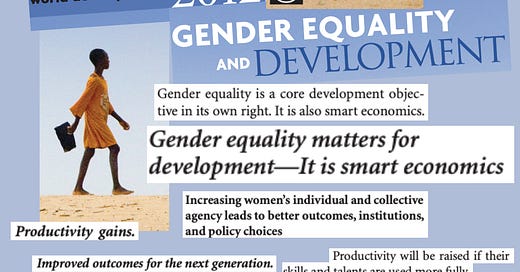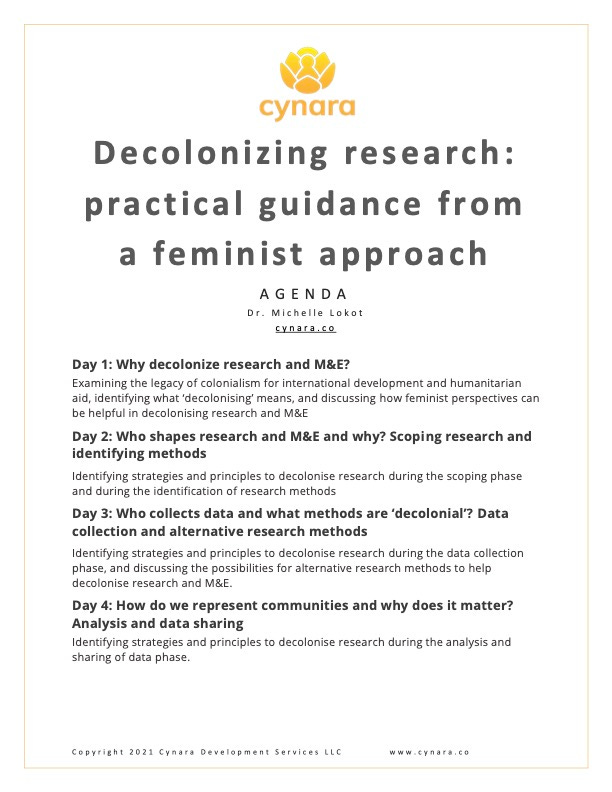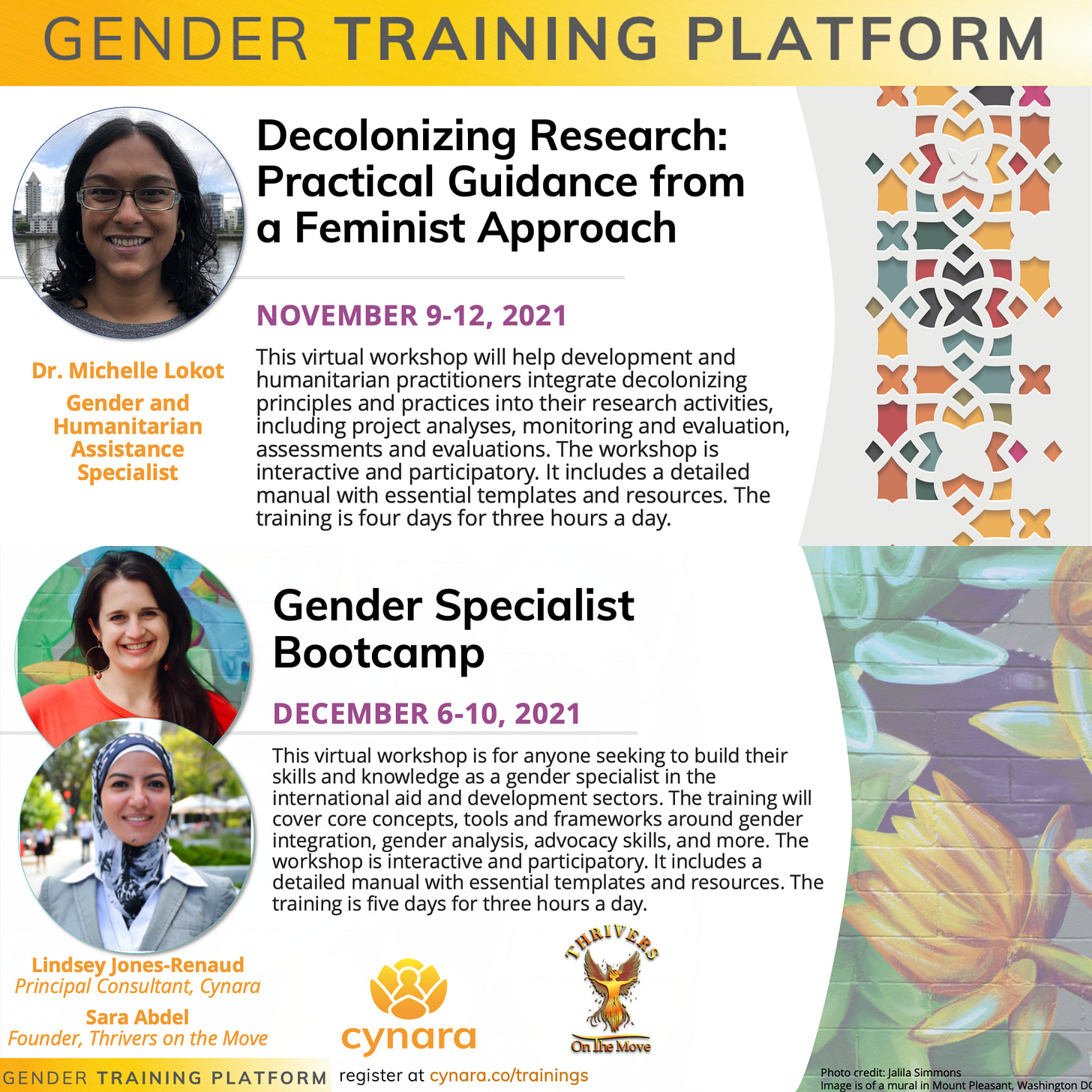Make it Practical #2: "Feminism and the politics of empowerment"
Giving language to the political-economic forces that made women's empowerment a capitalist, market-oriented project.
My last “Make it Practical” post was about the radical roots of women’s empowerment and how the term and approach was co-opted by government and development agencies. I like this next article, “Feminism and the politics of empowerment in international development,” by Carole Biewener and Marie-Hélène Bacqué (2015)1, because it gives a bigger picture of the broader politics that were at play during this and subsequent periods of co-optation. It’s about how two political economic trends - neoliberalism and social-liberalism - influenced the evolution and application of women’s empowerment in the international development sector, and how those trends differed from a feminist approach to empowerment.
I see myself and my work reflected in this article. Through this macro lens, it offered me a deeper perspective about the dynamics I was dealing with – often unknowingly – at the time. In doing so, it offers lessons for how I approach my advocacy and work in the sector today.
women’s empowerment as “smart economics” (aka neoliberalism)
I understand neoliberalism as the political and economic shift toward finding market-based solutions to political and social problems within a capitalist economic system. It gained traction in the 1980s and still influences us today. The authors explain that the influence of neoliberalism on institutions like the World Bank resulted in a market-centered approach that focused on how women’s empowerment can impact economic growth. It argued that women’s empowerment is actually a tool for achieving economic gains. The 2006 statement from World Bank Group president, Robert Zoellick, that women’s empowerment and gender equity are “smart economics” exemplified this neoliberal influence.

In practice, Biewener and Bacqué explain that neoliberalism approached empowerment as something that happens primarily to individuals and not to collective groups of oppressed and subjugated people. Policies and programs focused mostly on increasing individual capacities (e.g., skill-building). This approach may benefit individual women, but does not shift gendered (or other) imbalances of power at a systemic level. In addition, they argue that this depoliticized, individualized, market-centered approach ultimately undermines movements for social change based on human rights:
By converting political and social problems into “market terms,” neoliberalism “converts them to individual problems with market solutions” and, thereby, it contributes to a “depoliticization” of social life along with the proliferation of norms of citizenship and participation based upon individual responsibility. Here empowerment’s emancipatory promise of self-actualization and self-determination has been harnessed to further an agenda that heralds the actions of self-interested, responsible, self-reliant, and entrepreneurial citizen/subjects oriented toward personal gain while undermining the legitimacy of social justice claims based on entitlements or rights (66).
Around the time that the World Bank made this proclamation, I was working as a gender specialist in an international development organization, charged with getting my colleagues to see how development programs affect and are affected by gender inequalities. The World Bank’s statement that women’s empowerment is “smart economics” was a powerful way to get my colleagues to take gender seriously. I used a video promo clip of this announcement in my trainings for them. I cringed at having to take this advocacy tactic; as a woman and feminist I know that I deserve equality simply because I deserve it, not because it is better for the economy. However, this economic growth-centered and efficiency-based language was effective.
women’s empowerment is “smart economics” AND a goal in itself (aka social liberalism)
Biewener and Bacqué explain that the social-liberal approach to empowerment added to the “smart economics” language by also pointing out that women’s empowerment is a goal in its own right. They recognize this approach in the World Development Report 2012: Gender Equality and Development, which described gender equality as not only being good for the economy, but also “a core objective in itself.” (Personal note: I lugged a hard copy of this World Development Report to Zimbabwe so that I could read it and incorporate its data and messaging in a report I was writing for USAID.)

The authors explain that this social-liberal approach is similar to neoliberalism in how it emphasized individualism over collective empowerment. It also focused on increasing individual-level capacities instead of structural change. However, they argue that social liberalism differs from neoliberalism in that it did try to reclaim some of the “consciousness raising” that was central to the original thinking around empowerment. It also differed from strictly market-centered approaches in how it considered the broader social context, asserting that markets can’t be the sole avenue for addressing women’s empowerment. It also acknowledged the influence of informal structures (such as social norms, ideologies, etc.) on people’s decisions and behaviors.
My personal experience: compromise?
The history and evolution of women’s empowerment in this article reminds me of the compromise I felt I had to make in my role at the time. Like many others, I took the instrumentalist advocacy tactic by leveraging the power players’ interest in women’s empowerment for the purposes of advancing economic growth, while also pushing them to also address intersecting social and political barriers to women’s rights. This aligns with the authors’ point that:
feminist theorizing and activism have contributed to shifting powerful mainstream development institutions such as the World Bank toward a more egalitarian, social-liberal capabilities approach that incorporates some attention to how institutional and social factors are at play (69)
Yet the authors also point out that although the World Development Report addressed “social and political empowerment” to some extent, it still mostly focused on market-oriented problems and solutions. Likewise, my observation has been that the nod toward social and political factors showed up more in rhetoric than in actual policy and programs. As Cynara advisor, Alfreda Nwosu, pointed out to me, feminist economist Naila Kabeer has been warning us of the risks of such instrumentalist forms of advocacy since at least the late 1990s.2
Another alternative: feminist empowerment
Biewener and Bacqué argue that social-liberalism had fallen short of the radical, liberatory roots of a feminist empowerment approach, both in terms of the goals of empowerment as well as the process. Because neoliberalism and social-liberalism approached empowerment primarily at the individual level, they did not seek to fundamentally restructure society in a way that would transform imbalances of power between and among groups. More specifically, the authors appear to be arguing that these empowerment approaches fall short by not addressing the exploitative nature of capitalism and the structural power imbalances between and among groups that it creates.
In other words, they appear to be arguing that the collective, liberatory nature of feminist empowerment is meant to be noncapitalist, and both neoliberalism and social-liberalism uphold capitalist systems. They concluded the article by pushing the need to produce and cultivate “new, noncapitalist economic subjectivities, practices, and social relations” (69).
Takeaways
The article left me with the following reflections:
What are the macro politics at play right now? It was interesting to me to read this history – of which I consider myself a part - from an outsider’s macro perspective. It was a reflective exercise that leaves me wondering: what are the macro-level economic politics at play right now? How are they affecting the gender and international development space and what does that mean for me and my work? As advocates, I think it is important for us to be aware of these broader politics at play so that we can navigate them and make strategic decisions about what to compromise.
Is feminism anti-capitalist? In my last post, I made a connection between the evolution and co-optation of ‘empowerment’ with the current movements around ‘feminist’ approaches to foreign policy and international development. After reading this (and other) articles and books that argue that feminism is – or should be – anti- or non-capitalist, I am even more curious/worried about the ways in which feminism is being massaged to appeal to pervasive macro political agendas like neoliberalism and neocolonialism. We need to be very clear what we are talking about when talking about feminist policies, and that includes talking about capitalism.
The constant struggle over when to compromise. I know that governments and donors set up the international development sector to work within capitalist systems and not transform them. Thus, mainstream development workers have little choice but to work within capitalist frameworks. It is assumed. I understand the need to compromise. Still, I find it helpful to be reminded of this assumption – as well as the alternatives. As for lessons for the growing use of ‘feminism’ to describe some international development approaches, I’m not ready to compromise feminism in the same ways I compromised women’s empowerment.
Systemic change and power within market-centered approaches to empowerment. One of the primary claims of the paper is that both neoliberalism and social-liberalism approach empowerment as an individual goal to be achieved. They focus on increasing individual capacities and opportunities, but not on systemic change that would fundamentally transform oppressive power structures between groups, including women, men, and gender-marginalized people, but also other social hierarchies, including those created by capitalism. Since then, there has been a growth in market-centered empowerment approaches in international development and corporate philanthropy that do focus on systemic change. But to what end? Is it possible for systemic change within capitalist markets to transform oppressive power structures? Or do systemic approaches within a market-centered, capitalist framework just work to restructure power into new or different hierarchies - or even just reinforce it?
Finally, I am happy that I am finally in a position where I can publicly say that this justification for women’s empowerment and gender equality as being “smart economics” is just plain offensive.
What do you think? Please leave a comment - I’d love to repost what some of you all think about these articles and my interpretation of them. Click below and tell me what you think!
**Thank you to Alfreda Nwosu for her feedback and brainstorming on this post!
Reminder! Upcoming trainings
My company has two upcoming trainings on our Gender Training Platform .
Decolonizing M&E and research: practical guidance from a feminist approach
Dates: Tuesday, November 9 - Friday, November 12
Time: Daily at 1pm - 2:30pm GMT (8am-9:30am EST) and 4pm - 5:30pm GMT (11am-12:30pm EST)
Trainer: Dr. Michelle Lokot, author of "The space between us: feminist values and humanitarian power dynamics in research with refugees."
Cost: $625, with discounts for folks not backed by an organization with a lot of resources
Gender Specialist Bootcamp
Dates: Monday, December 6 - Friday, December 10
Time: Daily at 9am-10:30am ET and 12-1:30pm ET
Trainers: Lindsey Jones-Renaud and Sara Abdel
Cost: $775, with discounts for folks not backed by an organization with a lot of resources
Biewener, Carole, and Marie-Hélène Bacqué. “Feminism and the Politics of Empowerment in International Development.” ASPJ Africa & Francophonie 2nd Quarter (2015).
Kabeer, Naila. “Resources, Agency, Achievements: Reflections on the Measurement of Women’s Empowerment,” May 1999.






